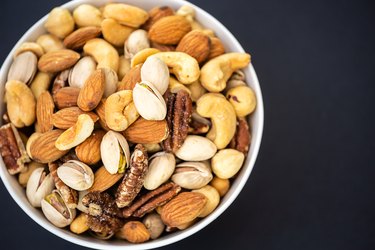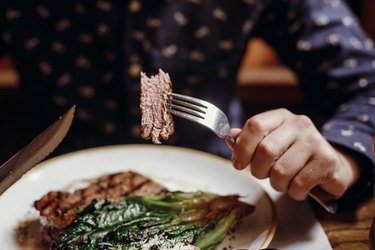
Nuts are among the most nutritious foods, full of heart-healthy monounsaturated fats, fiber and minerals like magnesium and potassium. So it may surprise you if eating nuts — whether tree nuts, like almonds and cashews, or peanuts — leads to stomach pain and discomfort.
Why Eating Nuts Can Hurt Your Stomach
Video of the Day
There are several factors that can cause stomach pain after eating nuts.
Video of the Day
1. Phytic Acid in Nuts May Irritate Your Stomach
Nuts and seeds naturally contain a compound called phytic acid, Lily Nichols, RDN, a registered dietitian nutritionist and author of Real Food for Pregnancy, tells LIVESTRONG.com.
"They specifically have this compound in order to protect them from sprouting before they're ready to grow," she explains. "It's evolutionary — the idea is that the seed or nut passes through an animal's GI system intact so it can plant in the ground and survive." (You may also hear this referred to as an "anti-nutrient.")
Problem is, for some people, phytic acid irritates the digestive system, according to University Hospitals. In order to break down phytic acid, you need the enzyme phytase, but your body doesn't produce that enzyme on its own, Nichols says. Adding to the complexity, there are also tannins present in pecans and walnuts that give some people tummy trouble.
"You may be more sensitive to certain compounds than others," she says. Some nuts may aggravate you while others do not, and keeping track of your symptoms in a food journal can help you pinpoint the offender.
2. You Could Have a Food Intolerance
Nut-induced stomach pain is likely not a food allergy, which is a process that involves your immune system and comes with the possibility of an anaphylactic (or full-body) reaction, according to the American College of Allergy, Asthma & Immunology. A true nut allergy is more likely to cause symptoms like wheezing or coughing, hives or swelling of the tongue than a stomachache.
What you might have is a food intolerance, explains Joseph Fiorito, MD, chair of gastroenterology at Danbury Hospital, part of Nuvance Health in Danbury, Connecticut.
If you have an intolerance to nuts, you may experience symptoms 1 to 4 hours after eating them and, along with stomach pain, you may also have a headache and nausea, he says. And pain isn't the only GI symptom you may experience: An intolerance to nuts can cause bloating and gas, too, according to the Cleveland Clinic (more on that below!).
3. You Ate Too Many Nuts
How big of a portion are you eating in one sitting? Your body may have trouble digesting a large amount of fat at once, especially if you're eating fast. "Large, undigested food particles put a strain on your digestive system," Nichols says.
If you're eating too many nuts at once, it may be because there's something lacking in your diet elsewhere. "I've observed that people who are overeating nuts are often doing so because they're not eating enough at meals, especially when it comes to protein," Nichols says. Consider your overall diet and be honest with yourself if you're consciously undereating.
A smart serving of nuts is generally about an ounce, according to the Cleveland Clinic.
The exception? Brazil nuts. It's possible, although rare, to get too much selenium (sometimes called selenium poisoning) if you overdo it on Brazil nuts specifically, according to University Hospitals. The symptoms are usually skin rashes, diarrhea, nausea and fatigue, not tummy discomfort. To be safe, it's best to stick to just one or two Brazil nuts rather than an ounce so you don't overdose on nuts.
4. You're Gassy and Bloated
Nuts are full of fiber. Overall, this is a good thing — fiber can help normalize bowel movements and promote gut health, according to the Mayo Clinic.
But if your body isn't accustomed to eating lots of the nutrient, high-fiber snacks like nuts can lead to gas and bloating. And that built-up gas can cause — you guessed it — stomach pain, per the Mayo Clinic.
To avoid this issue, gradually add fiber-rich foods like nuts into your diet over the course of a few weeks to give your body time to adjust, according to the Mayo Clinic.
How to Relieve Stomach Pain From Nuts
Though you may not experience total relief until your body has fully digested the food, the best methods for relieving a nut bellyache are similar to the measures you can take to ease any tummy troubles.
If you feel gassy, bloated or crampy after eating nuts like almonds, cashews or pistachios, as well as peanuts (technically a legume), here are some natural remedies for an upset stomach that may help:
- Eat plain, non-irritating foods like bananas, rice, applesauce and toast.
- Eat probiotic-rich foods like yogurt or kefir.
- Drink plenty of water.
- Sip ginger, peppermint or licorice root tea.
- Do gentle yoga to aid digestion and ease bloating.
- Avoid dairy products, carbonated drinks, alcohol and smoking.
When to See a Doctor
Talk to your doctor if your stomach pain after eating nuts concerns you or lasts more than a few days, according to the Mayo Clinic. A doctor or registered dietitian can help you identify potential food intolerances, issues with portion sizes or underlying health conditions.
Seek immediate medical attention if you have severe stomach pain after eating nuts or your pain is accompanied by fever, blood in your stool, abdominal swelling or nausea and vomiting. Particularly intense nut-induced discomfort could be a sign of a larger digestive issue like gallstones, ulcers or irritable bowel syndrome, per the Mayo Clinic.
- American College of Allergy, Asthma & Immunology: "Food Allergy"
- Mayo Clinic: "Dietary fiber: Essential for a healthy diet"
- Mayo Clinic: "Gas and gas pains"
- Cleveland Clinic: "Food Intolerance"
- University Hospitals: "Can You Overdose on Nuts?"
- Cleveland Clinic: "The Health Benefits of Nuts"
- Mayo Clinic: "Abdominal Pain"
Is this an emergency? If you are experiencing serious medical symptoms, please see the National Library of Medicine’s list of signs you need emergency medical attention or call 911.



